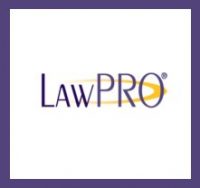« Return to 2014 October - Insurance Issue 2015 Issue Index
Exemption eligibility for “employed” lawyers

A common fallacy is that all lawyers who work in a corporate, government, education or municipal setting will be entitled to an exemption from the requirement to pay LAWPRO premiums for the Law Society’s mandatory insurance program. Depending on the employment relationship and the nature of the work, this may not be true.
To qualify for one of the “single employer” exemptions under the Law Society insurance program (Exemptions D and E), the lawyer must be employed by a single employer and not engage in the practice of law in Ontario other than for and on behalf of that employer.
Employed by a single employer
While the situation for a lawyer who is engaged in the practice of law as an employee of a corporation and doing work only for and on behalf of that corporation is clear (they would be exempt), the circumstances in which lawyers do work for their employer or clients vary widely.
For example, the following do not meet the exemption requirements:
- Independent contractor relationships – the essence of an independent contractor relationship is that the contractor is not an employee.
- Crown attorney work on a contract to the provincial or federal government – once again, the contractor is not an employee. (This is different from a crown attorney employed by the government, who would meet the first part of the exemption test).
- Employed lawyers who do work for different units in a corporate group that don’t fall within the definition of “employer” in Law Society By-law No. 6: unless that definition is met, the lawyer cannot claim exemption because he/she does not have a single employer. The by-law specifies that “employer” includes a corporation, any affiliated, controlled and subsidiary company of the corporation and any other entity employing the lawyer, and “affiliated,” “controlled,” and “subsidiary” have the same meanings given them in the Securities Act.
- Lawyer employed by a single employer, but duties include performing legal services for others (such as customers of the employer or fellow employees) – the lawyer is also engaged in the practice of law on behalf of someone else.
Engaged in the practice of law
Why is this relevant? To qualify for the “single employer” exemption, the lawyer cannot engage in the practice of law in Ontario other than for and on behalf of that employer. The nature and type of work undertaken by lawyers in corporate or other non-law firm settings will vary widely, and will often include legal and non-legal tasks.
So, if the work you are doing for others (i.e., anyone other than your sole employer) isn’t the practice of law, you may still qualify for the exemption.
Generally speaking, if a lawyer uses his or her legal knowledge, judgment and/or skill when working on a matter, and a solicitor/client relationship is established, it can be expected that the lawyer has engaged in the practice of law for the purposes of the LAWPRO exemptions. Job titles, task descriptions, ultimate supervision of the work and the existence of other types of insurance are not determinative of exemption eligibility.
Consider a lawyer doing document review work for litigation matters. A lawyer who is reviewing documents for relevance and production obligations, assessing documents for privilege, or identifying documents to support legal arguments and defences, would be seen to be engaged in the practice of law in determining eligibility for LAWPRO exemptions. On the other hand, a lawyer who is summarizing or condensing volumes of information for publishing purposes would not be seen to be engaged in the practice of law because that type of task doesn’t require the skill or knowledge of a lawyer.
Call us if you have questions
We recognize that the employment and work circumstances of lawyers will vary widely. If you need help determining if you qualify for an exemption as an employed lawyer or if you are engaged in the practice of law, please contact the LAWPRO Customer Service Department at [email protected] or by phone at 1-800-410-1013 or 416-598-5899.
We will review your situation and give you direction based on the provisions of the LAWPRO policy.
